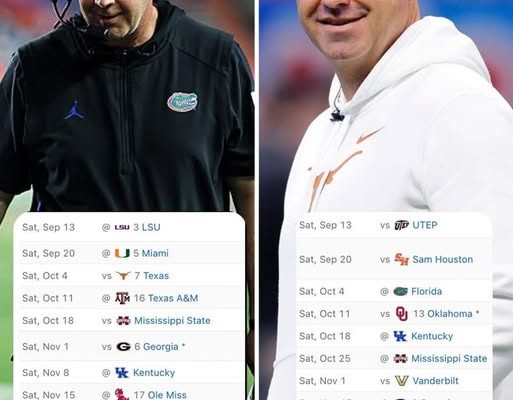The college football season always finds a way to create conversations that go beyond the results on the field, and few debates get fans talking louder than comparing two powerhouse programs as they chase playoff hopes. This year, Florida’s remaining schedule and Texas’s upcoming slate have already become one of those topics that stir both excitement and controversy. Each program has different expectations, different challenges, and different narratives surrounding them, but both understand that the next few weeks will determine whether their seasons end with glory or heartbreak. What makes this conversation so intriguing is how fans, analysts, and players alike are weighing not just the caliber of opponents left on each schedule, but also the timing of those games, the potential for trap matchups, and the bigger playoff picture looming over every snap.
For Florida, the path ahead has the feeling of a gauntlet. The Gators have shown flashes of brilliance this season, but they also carry the burden of inconsistency, a factor that makes every upcoming matchup feel like a potential turning point. Their remaining schedule is stacked with SEC rivals who have historically tested them in ways no other conference can. Even when the opponent is not ranked in the top 10, the SEC’s reputation ensures that no game can be overlooked. Florida fans are fully aware that a slip in October or November could undo months of hard work, especially with the committee placing heavy value on strength of schedule. The Gators will have to find the balance between leaning on their explosive offensive weapons and shoring up a defense that has shown vulnerability against high-powered attacks. What adds to the intrigue is the perception that Florida’s toughest games could define whether they’re viewed as pretenders or true playoff contenders.
Meanwhile, Texas’s story takes on a different shape. The Longhorns came into the year with tremendous hype, fueled by recruiting wins, coaching stability, and a fan base that has been desperate to see the program fully return to national dominance. Texas’s remaining schedule may not have the sheer brutality of an SEC grind, but it comes with its own set of high-stakes challenges. The Big 12 is never as simple as outsiders make it seem, as the conference has a way of producing upsets that shake the national landscape. Texas has rivals waiting on their calendar who have circled this matchup as their chance to topple a giant. The Longhorns have talent at nearly every position, but their ability to execute week in and week out is what will ultimately define whether they’re legitimate playoff material. Their fans love pointing out that Florida’s schedule is filled with SEC landmines, but they also argue that Texas’s late-season games carry just as much weight because the margin for error is so thin.
Comparing the two schedules side by side paints a picture of differing philosophies and challenges. Florida’s slate is heavy with physical, defensive-minded battles that will test their endurance and toughness. Games against rivals with punishing ground games and ferocious pass rushes mean that Florida’s offensive line and quarterback will be put under constant pressure. There are also road trips that fans dread, not because the opponent is always elite, but because the environment can rattle even the most composed teams. Texas, on the other hand, faces a mix of stylistic opponents. Some games will force them into shootouts where their quarterback and wide receivers must dominate, while others will test whether their defense can make critical stops against dynamic dual-threat quarterbacks. The differences make the comparison difficult, but they also make it fascinating.
What fuels the controversy is the way fans and analysts discuss which team has the “harder” road ahead. Florida supporters argue that nothing compares to the SEC’s week-to-week grind, and history supports their point, as the conference routinely sends multiple teams into the playoff conversation. For them, simply surviving the next few weeks without multiple losses would prove more about their team’s toughness than anything Texas might face. Texas backers counter that while Florida’s opponents may look tougher on paper, the SEC reputation often overshadows the reality that some of those teams are not as dominant as past years. They point out that the pressure of being Texas, the constant target on their back, and the necessity of being nearly flawless to gain playoff respect creates an equally brutal gauntlet. For them, Florida may be fighting heavyweights, but Texas is navigating a minefield where one misstep could derail everything.
The playoff committee’s perspective adds another layer to this conversation. Strength of schedule is often brought up as a factor, but the committee also values signature wins and consistent dominance. Florida’s path offers the chance for multiple marquee victories that could impress the voters. Beating a ranked SEC rival late in the season carries enormous weight, and the committee tends to reward teams that survive those wars. Texas’s remaining schedule may not feature as many ranked opponents, but it does include games with historic rivalries and emotionally charged atmospheres, the kind of matchups that capture national attention. If Texas runs the table convincingly, they could argue their case just as strongly as Florida. The real debate is whether the committee will value Florida’s potential high-profile wins more than Texas’s consistency.
Coaches and players know better than anyone that looking too far ahead is dangerous, yet even within the programs, the schedules become part of the motivation. Florida players are constantly reminded of the physical toll the SEC demands, and many see the schedule as a proving ground not just for the team, but for their NFL futures. Surviving the next few weeks without collapse would show scouts and critics alike that they belong in the toughest environments. Texas players, on the other hand, embrace the underdog narrative that often follows them despite their talent. They hear the voices that say their schedule is softer, and many take it personally. For them, each remaining game is an opportunity to prove that they deserve to be ranked alongside the nation’s elite without the asterisk of playing in a supposedly weaker conference.
Fans also play a massive role in fueling the controversy. Florida fans thrive on the SEC pride that has defined the conference for decades, often throwing shade at Texas supporters by suggesting that the Longhorns could not survive a week-to-week SEC grind. They love to highlight past games where Big 12 teams collapsed against SEC competition, pointing to history as proof of what lies ahead. Texas fans, however, have their own ammunition. They point to recent bowl victories, recruiting success, and their ability to go toe-to-toe with SEC opponents when given the chance. For them, Florida’s schedule might look intimidating, but Texas’s path requires a level of focus and consistency that SEC teams often underestimate. This back-and-forth banter is what makes college football so captivating.
The national media has also fanned the flames. Analysts on major networks debate daily whether Florida or Texas has the tougher road ahead, often framing it as a referendum on conference strength. Some highlight that Florida’s schedule could break even the most talented rosters, while others argue that Texas’s need to remain flawless creates a pressure cooker atmosphere that few programs could survive. Social media only amplifies the debate, with fans posting side-by-side comparisons, bold predictions, and even betting odds to prove their point. Every week, as results come in, the conversation shifts slightly, fueling more heated arguments about which program is truly facing the greater test.
Looking beyond the debate, what makes this comparison truly fascinating is how it will shape the playoff picture. If Florida emerges from its schedule with only one loss, it would be nearly impossible for the committee to ignore them. The narrative of conquering the SEC slate would push them into the playoff conversation even if other contenders remain undefeated. For Texas, the key is dominance. Winning close games may not be enough to sway the committee if Florida or another SEC team has signature wins. The Longhorns must prove that they are not just winning, but winning convincingly, to erase any doubts about their conference strength. The different paths to legitimacy show just how unique and unpredictable college football truly is.
As the weeks unfold, the comparisons will only grow louder. Every Florida game will be scrutinized for signs of vulnerability, every Texas matchup dissected for evidence of dominance or fragility. The debate over which team has the tougher road may never truly be settled, but that is part of what makes the sport so compelling. Fans will continue to argue, analysts will continue to speculate, and players will continue to fight for validation on the field. Florida and Texas may not face each other this season, but in many ways, their seasons are intertwined through the lens of comparison. What remains certain is that college football thrives on these debates, and the coming weeks promise to deliver drama, controversy, and unforgettable moments as both programs march toward their ultimate goals.
Both Florida and Texas know that the margin for error is razor-thin, and both understand that their schedules, while different, are equally unforgiving in their own ways. What separates them will not just be the opponents they face, but the way they respond to adversity, the way they handle the pressure, and the way they seize opportunities when everything is on the line. By the time the season ends, fans may finally have their answer about whose road was tougher, but until then, the only certainty is that the debate will rage on, louder with every passing week, and college football will be better for it.



